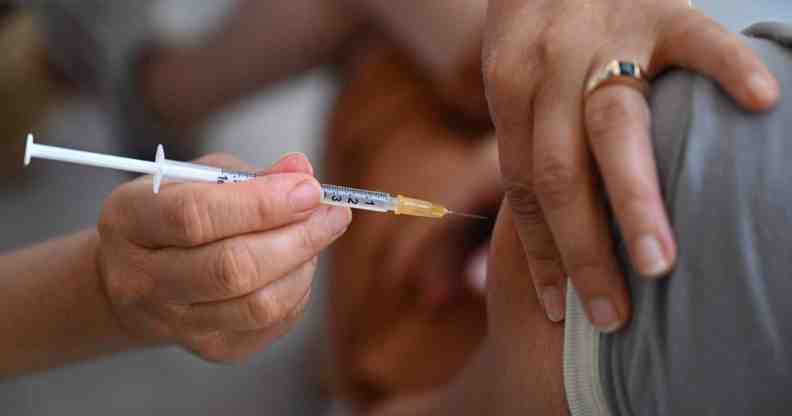Monkeypox: Experts investigating why 12 people have died during outbreak

A person receiving a vaccine. (Christophe Simon/AFP via Getty)
Experts are trying to understand why a small number of people have died from the current monkeypox outbreak.
Deaths resulting from the monkeypox outbreak currently stand at 12, according to America’s Centers for Disease Control and Prevention (CDC), with five of these fatalities in places that have not historically recorded monkeypox, including India and Spain.
More than 38,000 cases have been reported globally. The virus is usually “mild” and most people recover within weeks without the need for treatment, according to the NHS.
The WHO’s technical lead on monkeypox Dr Rosamund Lewis confirmed the organisation has asked countries to provide information on the deaths so that they can develop a better understanding, CNN reports.
The outlet reported that two men who died in Spain, in apparently unrelated cases, both developed encephalitis (swelling of the brain) before falling into comas.
Andrea McCollum, an epidemiologist and pox virus expert at CDC, told CNN: “Why some of these patients have encephalitis is something we don’t know.”
McCollum added: “We are aware of a good number of patients here [in the United States] that have been hospitalised… so it still is a very serious illness.”
She added that in Central Africa’s Congo Basin, a higher percentage of monkeypox cases are fatal, largely because most of the population has not been vaccinated even against the smallpox virus, which does offer some protection against monkeypox.
Campaign group Global Justice Now says that not a single vaccine has been administered in Africa since the outbreak began in May, and has called on the company making the smallpox vaccine being used globally to share its manufacturing method so that more jabs can be produced.
In the US, those who are being hospitalised may simply need pain management, whereas some people with risk factors like lowered immunity, HIV, pregnancy, or young children may have to be admitted so doctors can closely monitor them.
Among the most common symptoms of monkeypox are lesions on the genitals and anus, fever, swollen lymph nodes, and body aches and pains; monkeypox usually clears up after a few weeks, and the vast majority of those who catch it will not die or need to be hospitalised.
Let's talk about #monkeypox : the virus, the symptoms & how it spreads ? pic.twitter.com/sS9M5NPrZF
— World Health Organization (WHO) (@WHO) August 16, 2022
In the UK, the latest statistics seem to suggest new infections may be slowing down due to the vaccine rollout.
According to new data, the UK experienced an average of around 29 new monkeypox cases a day from 1 to 7 August, compared to 52 average daily cases in late June.
According to UK Health and Security Agency (UKHSA) incident director Dr William Welfare, this data “suggests the growth of the outbreak has slowed”, but that the public should remain cautious.
“Please continue to be aware of symptoms, including rashes and blisters, particularly if you have recently had a new sexual partner,” he added.
A UKHSA report showed that as of 10 August, around 27,000 people in England had been vaccinated with a smallpox vaccine.
However, that programme will imminently grind to a halt, as the UK is on the verge of running out of doses, with more to be delivered in September.
Claire Dewsnap, president of the British Association for Sexual Health and HIV, said: “It is disappointing we’re now going to have a gap between now and the next vaccine, but I think it is a reflection of the fact that people have gone out and got their vaccine.
“We are doing our very best to help and as soon as we get vaccines we’ll get you in.
“The weight is being borne by the [LGBTQ+] community and we don’t want people to feel that way, so we’re working really hard to make sure this happens.”

